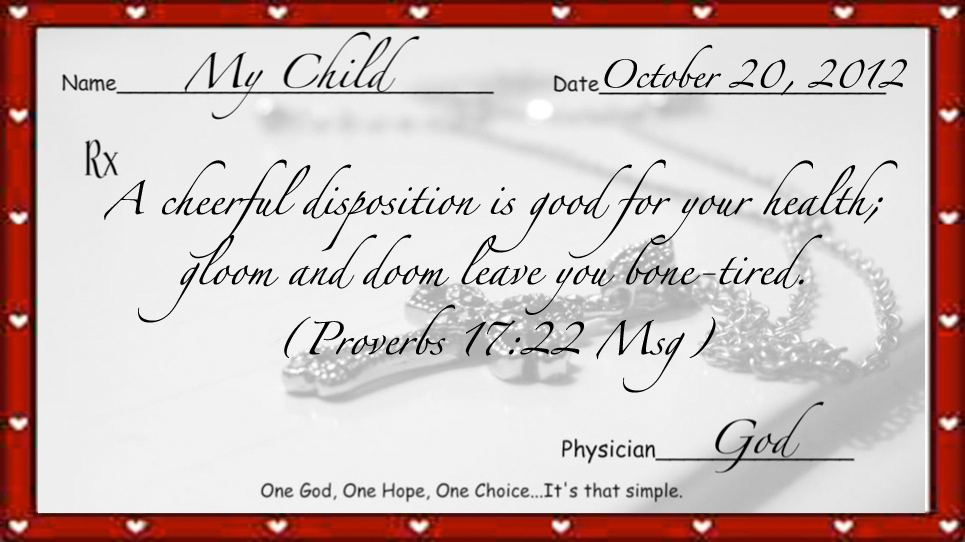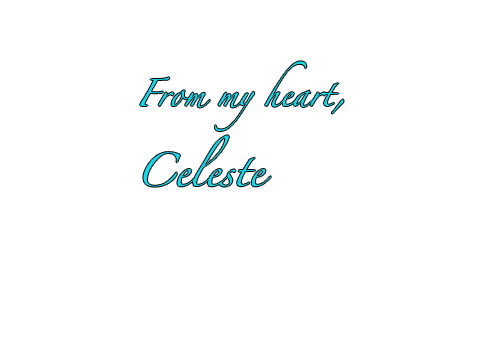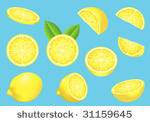Tips to a Happier You in 2012~Laughter really is the best medicine
Tips to a Happier You in 2012~Be careful little ears what you hear
- Stimulation of certain centers in the left pre-frontal cortex has been shown through EEGs to lift the mood, causing feelings of peace, serenity and optimism.
- Stimulation of the medial temporal lobe system brings about adaptations of the central nervous system to induce appropriate integration with the limbic system, which is the seat of the brain’s emotional responses.
October 19, 2011
Antidepressants apparently keep a lot of people functional, according to new data from the federal government.
The most recent statistics about antidepressant use in the United States, released Wednesday, show 11% of Americans ages 12 and older take the medication. Antidepressants are the most common prescription drug used by people ages 18 to 44. Almost one-quarter of all women ages 40 to 59 take antidepressants.
Click here to read the entire article. You will be stunned.
What if some disaster happened and drugs were suddenly unavailable? Where would that leave us? Our need for medication keeps us imprisoned. Sometimes this is unavoidable, and we deal with it.
But are 11% of all Americans over 12 years of age really clinically depressed?
I don’t think that’s part of God’s plan. Do you?
P.S. Click here to go to my delicious stack with more articles on sound therapy and depression.
P.S.S. In case you’re really interested in Sound Therapy specifically, Here are some links for sound therapy providers, but I think the right music on iTunes can be pretty effective 😉
Tip to a Happier You in 2012~I’ve been kidnapped!
Well, here it is Saturday evening, and I haven’t posted my {tip to a happier you} for today yet. But I have a good excuse:
Miranda is one of those girls that loves for her friends to spend the night. I have always loved it that she wants them to come here, so we frequently allow them to.
When I was depressed, I often found myself watching television and getting wrapped up in others lives so I didn’t have to think about my own. But I would DVR them and only get to watch them when they aired on television. Now we have Netflix. You can sit and literally watch 84 episodes back to back—pausing for potty breaks of course. I suppose it’s a good thing we didn’t have Netflix when I was going through depression. Sitting absorbed in someone else’s life for hours at a time would have been just fine with me, but I think my family would have thrown me to the curb.
Tips to a Happier You in 2012~Made to Crave
Here are a few things I know about taste and mood:
- It makes us happy to eat something sweet…a comfort food.
- If we eat a healthy diet, we feel better and are therefore happier.
- A spoonful of sugar helps the medicine go down.
- We feel happier—more satisfied—when our stomachs are full.
- Food is often about relationships. Relationships between us and God, us and friends, and us and our own soul.
We crave whatever is a part of our life—what we do, who we see, what we eat, what we drink, etc.
- If we watch pornography, we want to watch more.
- If we drink alcohol—or Mountain Dew—we want to drink more.
- If we use drugs, we want them more (And I’m a witness to that one!)
The neat thing is, though, that the flip side of this is true as well.
- If we read about God, we want to know more.
- If we become a volunteer, we want to volunteer more.
- If we begin tithing, we want to tithe more.
“Whether we’re on the path toward victory or defeat is determined by the very next choice we make. Not the choices from yesterday. Not the choices five minutes ago.” ~Lysa Terkeurst
Tips to a Happier You in 2012~The Power of Touch
I’m back to my posts on how we can use the five senses God gave us to fight depression and made us happier. Today it’s the power of touch.
The touch of Jesus is illustrated through story after story in the Bible.
- The story from the prescriptions verse above where he touched the leper and healed him.
- The story of Peter when he stepped out of the boat to walk on water. When he took his eyes off Jesus, he began to sink. But when Jesus took his hand, they walked across together.
- The story illustrated in Matthew 28 where Jesus touches the eyes of the blind man and restores his sight.
- The story in Mark chapter 7 where Jesus healed the man who was deaf and dumb through touching his ears and his tongue.
- The story in Luke chapter 8 where the woman touched the hem of Jesus’s garment and was healed.
The benefits of touch seem to stem largely from its ability to reduce levels of cortisol, a stress hormone manufactured by the adrenal glands. This was measured in two dozen studies. She said that touching with moderate-pressure (a firm handshake) stimulates activity in the vagus nerve, one of the 12 cranial nerves in the brain, which in turn slows the heart and decreases the production of stress hormones including cortisol (remember, that’s the fight or flight hormone I’ve discussed in other {tips to a happier you} posts).
Other studies published from the Touch Research Institute, published in peer-reviewed journals, demonstrate that touch contributes to…
- Decreased pain. Children with mild to moderate juvenile rheumatoid arthritis who were given messages by their parents 15 minutes per day for one month experienced less anxiety and lower cortisol levels. Over a 30-day period, parents, kids, and their physicians reported less pain overall in the children.
- Enhanced immune function. In studies, women with breast cancer and HIV patients showed a measurable increase in natural killer cells—part of a line of defense in the immune system against virus-infected cells and cancer cells—after massage. They also experienced less anxiety and depression.
- Happier, healthier babies. Preemies who were touched more while in the NICU gained more weight.
- Less labor pain. Women in labor who received a backrub the first 15 minutes of every hour of labor reported less pain and made fewer requests for pain medications. Their labor was also shorter, on average.
- Enhanced alertness and performance. Following massage, adults completed math problems in significantly less time and with fewer errors.
Okay, enough of the sciency stuff. I think you’re getting my point.
When we were in Chicago last week meeting the head honchos of the home health franchise we are looking into, there was a very unique impression made on me by Shelley, the president/CEO of the company. After our initial dinner meeting—which consisted of ten couples and a few executives—she bid us good-bye with a hug…each and every one of us. I’m guessing that as a CEO of a successful company, she knows the value of a hug.
If God worked through the touch of his son Jesus, he can work through our touch. After all, we are his children too!
Tips to a Happier You in 2012~Happiness by Choice
Tips to a Happier You in 2012~Choosing to See Truth
As a pharmacist who became the patient for seven years, I gained quite the understanding on depression. If you’ve never experienced it, I’m rejoicing with you! It’s not a place you want to go. If you have experienced it…well, I’m right there with you.
In the gloomy pit of despair and hopelessness that is depression, desperation is born. The desire to be out of that pit is overwhelming. We will do anything to get out.
Prozac, one of the most prescribed medications for depression, was approved by the FDA just as I began practicing. It was the first antidepressant in its class of serotonin reuptake inhibitors. That particular class has grown drastically over the last twenty-two years and has actually spun off into a new class—serotonin-norepinephrine reuptake inhibitors. For a list of the serotonin reuptake inhibitors, click here. For a list of serotonin-norepinephrine reuptake inhibitors, click here.
During my first fourteen years as a pharmacist, I couldn’t begin to tell you how many Prozac, Zoloft, and Paxil prescriptions I filled. I never understood the desperation behind those prescriptions. In the last few years, Cymbalta—one of the newer antidepressants—has gained popularity. Drug companies in the U.S. have invested millions in research, marketing, and advertising making antidepressants the most prescribed class of drugs in our country.
A 2007 article at CNN Health, “CDC: Antidepressants most prescribed drugs in U.S.,” says the following:
According to a government study, antidepressants have become the most commonly prescribed drugs in the United States. They’re prescribed more than drugs to treat high blood pressure, high cholesterol, asthma, or headaches. CNN’s Elizabeth Cohen discusses the CDC study on antidepressants.
In its study, the U.S. Centers for Disease Control and Prevention looked at 2.4 billion drugs prescribed in visits to doctors and hospitals in 2005. Of those, 118 million were for antidepressants.
A 2011 article at Harvard Health Solutions, “Astounding increase in antidepressant use by Americans,” gave the following statistics:
- According to a report by the National Center for Health Statistics (NCHS), the rate of antidepressant use in this country among teens and adults (people ages 12 and older) increased by almost 400% between 1988–1994 and 2005–2008.
- 23% of women in their 40s and 50s take antidepressants, a higher percentage than any other group (by age or sex)
- Women are 2½ times more likely to be taking an antidepressant than men (click here to read a May 2011 article in the Harvard Mental Health Letter about women and depression)
- 14% of non-Hispanic white people take antidepressants compared with just 4% of non-Hispanic blacks and 3% of Mexican Americans
- Less than a third of Americans who are taking a single antidepressants (as opposed to two or more) have seen a mental health professional in the past year
- Antidepressant use does not vary by income status
Bright colors, such as yellow, reflect more light and stimulate the eyes. Yellow is the color that the eye processes first, and is the most luminous and visible color in the spectrum.
Dr. Ronald Dworkin tells the story of a woman who didn’t like the way her husband was handling the family finances. She wanted to start keeping the books herself but didn’t want to insult her husband.The doctor suggested she try an antidepressant to make herself feel better.She got the antidepressant, and she did feel better, said Dr. Dworkin, a Maryland anesthesiologist and senior fellow at Washington’s Hudson Institute, who told the story in his book “Artificial Unhappiness: The Dark Side of the New Happy Class.” But in the meantime, Dworkin says, the woman’s husband led the family into financial ruin.
“Doctors are now medicating unhappiness,” said Dworkin. “Too many people take drugs when they really need to be making changes in their lives.”
We have a choice.
We choose what we see.
Tips to a Happer You in 2012~When life gives you lemons, sniff them!
God gave us five senses—hearing, sight, taste, touch, and smell. All of these senses send direct messages to our brains. Consider the information given by the Social Issues Research Center on the subject of fragrance and emotion:
The association of fragrance and emotion is not an invention of poets or perfume-makers. Our olfactory receptors are directly connected to the limbic system, the most ancient and primitive part of the brain, which is thought to be the seat of emotion. Smell sensations are relayed to the cortex, where ‘cognitive’ recognition occurs, only after the deepest parts of our brains have been stimulated. Thus, by the time we correctly name a particular scent as, for example, ‘vanilla’ , the scent has already activated the limbic system, triggering more deep-seated emotional responses.
- Coffee = Morning
- Fir = Christmas
- Coconut=The Beach
- Lemon=Clean
Studies on the effect of scents on mood show the following examples:
- Natural plant odors make people calmer, more alert, and in better moods than those in an odor-free environment.
- Orange, lavender, coffee, and licorice increase attention span.
- The smell of cleaning supplies makes people more generous.
Tips to a Happier You in 2012~Have a Happy Mother’s Day!
To all of you who are mothers, Happy Mother’s Day! To all of you who are not biological mothers, you have the opportunity to be a mother to someone. All it takes is love…unconditional love.
Every child has a love language, and all three of my children get their love tanks filled with my undivided time and attention. So this mother’s day, whether you are a child spending time with your mother, or a mother spending time with your child(ren), or just spending time with someone you love, my {tip to a happier you} for mother’s day is to fill someone’s love tank.
I’m filling my kid’s (and hubby’s) love tank this weekend by putting away my computer. It may seem like a vacation for me, but trust me, it’s a sacrifice…especially with a writer’s conference coming up next week.
So fill someone’s love tank this weekend. Remember, doing something for someone else helps you take the focus off of yourself, and altruism actually has been proven to increase those good hormones in your brain to make you happy!
Tips to a Happier You in 2012~Learning What’s Urgent vs. What’s Important
- Our little girl asking us to sit down and read a book, but we were too busy checking emails?
- Our teenager wanting us to meet her for lunch, but we have too many errands to run?
- Our kids begging to go to the pool, but we say it’s just too hot outside…so we stay home and mow the lawn instead?
- How the cabinets and floors sparkled every Saturday night in preparation for a new week?
- How much fun dad always had playing golf every Saturday?
- How mom sat at the computer every waking hour of the day? (Stepping on my own toes bigtime)
- How dad’s coworkers respected him because he was at the office by 7:00 am and didn’t leave work until after 7:00 pm?
- How there was always one more thing that had to be done before they could go out and play?
- The grass is up to my knees, but my kids want us to bake cookies and watch a movie. The grass can wait.
- I’m really not hungry and need to go to Wal-Mart before Marlee gets out of school, but Miranda and her boyfriend want me to meet them for lunch at La Fogata. Am I going to remember going to Wal-Mart (again) or having lunch with my soon-to-be-in-college daughter? So what if they only want me there so I will pay?
- I have to be up early to work Friday morning, but the premier of the Hunger Games movie is at midnight Thursday night and Trevor really wants to go.
Tips to a Happier You in 2012~Stretch Your Way to Happy
When Marlee was just a toddler, she would stretch endlessly. When I would go to get her up in the mornings, she would stall saying, “Hang on, I’m not finished stretching yet.” And she would stretch to one side, then the other, procrastinating because she didn’t want to get out of bed.
But she always got up in the best of moods!
Stretching does so much for our mind and body. When I get up in the morning, I try to take lessons from Marlee and stretch for a minute. I’m immediately energized and awake. At night, if I can’t sleep, I stretch my arms and legs as far as I can, hold the stretch, and then relax every muscle in my body.
There is something that happens when I do this that feels like peace washing over me…which is why I picked the prescription verse above.
I’d like to think that I’ve had the peace of God many times in my life, but nothing like I felt when He healed me in 2010 of seizures, depression, and addiction. I was in the car listening to a song by Phillips, Craig, and Dean called Mercy Came Running, being totally thankful for the mercy that God showed me when He chose to heal me, and I literally felt peace wash down over me, starting at the top of my head, running down my hair and face, then over my shoulders—kind of like the green slime kids get poured over them on Nickelodeon, only not so gooey! 😉
When we stretch out our muscles, we release endorphins in our brains that give us a peace of sorts…a sense of well-being and calmness. Maybe not as good as God’s peace washing over you, but he did create the hormones in our brain, so in a sense, it is His peace!
Here are a few other ways stretching is good for you:
- Stretching relieves your body of stress, therefore decreasing your cortisol levels and increasing your serotonin levels.
- Stretching helps put your muscles in a more relaxed state, therefore helping you sleep better.
- When you stretch, you are focused on your muscles…contracting and relaxing them with a regulated breathing pattern, which also increases serotonin.
- Stretching increases blood flow in your body, therefore reducing the stress on any particular system in your body (cardiovascular, respiratory, nervous system).
So the tip to a happier you for today is simple—stretch. If you read Monday’s post, and you have your post-it note up to remind you to say your “trust” prayer, just use it to remind you to stretch too. Again, it only takes a few minutes and what do you have to lose?
Tips to a Happier You in 2012~Do what you love
I love to take pictures of people. It’s both challenging and rewarding to capture the essence of someone’s personality in a photograph. Sometimes you can see personality characteristics in a photograph that you can’t see in real life. We were created in God’s image, and every single one of is is a masterpiece created by the Master Creator.
One of the best ways to fight depression—or even just the blues—is to do something that you love. For me, photography is one of my “somethings.” Here are the reasons photography makes me happy:
- It is a creative outlet
- It keeps my mind focused and busy
- It allows me to interact with people
- It allows me to do something for someone else
- It gives me a sense of accomplishment
All of these reasons I enjoy photography actually increase the endorphins and chemicals (serotonin, dopamine, oxytocin) in my brain that increase my mood and sense of well being. Doing something that you love, whether it’s photography, music, gardening, carpentry, etc…have most of the characteristics I listed above.
Tips to a Happier You in 2012~The Artificial Sweetener Conspiracy
Since we’ve been talking about how sugar affects your health, I thought it would be helpful to look into the plethora of sugar substitutes available to us today that are FDA approved.
My research, most of which I already knew, brought me back to the conclusion I shared in an old blog post, God’s Pharmacy. We just can’t leave well enough alone. God gave us some great stuff when he created the earth! But we insist on manipulating it to suit our desires.
Here is a great list of the FDA approved artificial sweeteners available to us I found in an article on the Spark People website:
Acesulfame-Potassium (Acesulfame-K) goes by the brand names Ace-K, Sunett and Sweet One. It is a combination of organic acid and potassium that is often blended with other sugar substitutes.
- 200 times sweeter than sugar
- 0 calories per gram
- Heat stable (can be used in cooking and baking)
- Produces no glycemic response
- ADI: 15 mg/kg body weight per day
Aspartame goes by the brand names Equal and NutraSweet. It is composed of two amino acids (proteins), aspartic acid and phenylalanine. Aspartame is one of the most thoroughly tested food additives, according to the FDA. People with the rare heredity disease phenylketonuria (PKU) should not consume aspartame.
- 160-220 times sweeter than sugar
- 4 calories per gram (metabolized as a protein), but because such a small amount is needed to sweeten foods and beverages, the calories provided by aspartame are considered negligible.
- Not heat stable (cannot be used in cooking or baking)
- Produces a limited glycemic response
- ADI: 50 mg/kg body weight per day
Neotame is one of the newest artificial sweeteners approved for use in packaged foods and beverages.
- 7,000-13,000 times sweeter than sugar
- 0 calories per gram
- Heat stable (can be used in cooking and baking)
- Produces no glycemic response
- ADI: 18 mg/kg body weight per day
- Rapidly metabolized and excreted
Saccharin goes by the brand names Necta Sweet, Sugar Twin and Sweet ‘N Low.
- 200-700 times sweeter than sugar
- 0 calories per gram
- Heat stable (can be used in cooking and baking)
- Produces no glycemic response
- ADI: 15 mg/kg body weight per day
Stevia (Rebaudioside A) goes by the names PureVia, Sun Crystals and Truvia. It is a steviol glycoside, one component of the stevia plant that provides sweetness.
- 250-300 times sweeter than sugar
- 0 calories and 0 carbohydrates per gram
- ADI: 0-4 mg/kg body weight per day
- Metabolized by the body into steviol, which is not absorbed in the blood and therefore leaves the body unchanged
Sucralose goes by the brand name Splenda.
- 600 times sweeter than sugar
- 0 calories per gram
- Heat stable (can be used in cooking and baking)
- Produces no glycemic response
- ADI: 5mg/kg body weight per day
- Poorly absorbed and excreted unchanged
Want to know what they all have in common? They are all synthetic chemicals.
I could write all day on the dangers of these artificial sweeteners. The lists are unending of the problems they can cause, the studies the have been done to prove their safety (or risks), and the questions they leave unanswered.
Now here’s a fun little list of possible dangers of artificial sweeteners:
- Weight gain (I know, quite ironic isn’t it?)
- Headaches
- Allergies
- Depression
- Anxiety and Panic Attacks
- Gastro-intestinal disorders
- Cancer
The stevia seems to be the most promising of possibilities for a good natural sweetener, but the form approved by the FDA sold in the US has been chemically altered.
So why do we put these chemicals in our bodies?
I’m going to give you some great articles to read if you’d like to read further, but I’m summing it up.
In one of the articles I read on the safety of Stevia and the concern for it’s FDA approval, this statement stuck out like a sore thumb:
In the U.S., we like to go to extremes,” adds toxicologist Ryan Huxtable of the University of Arizona in Tucson. “So a significant number of people here might consume much greater amounts.” (Nutrition Action)
Now read today’s prescription verse. Yes, I know it’s about wine—a little wine that is— but shouldn’t it apply to everything? It’s about moderation and using what God gave us. When it comes to sugar and artificial sweeteners, I’m going with plain old unsweet. If I must have something sweet, a little cane sugar (the most natural form of sugar we can buy) seems to be the safest answer. If the natural form of stevia is easy to buy, I will use it as well. As for all the rest, STAY AWAY! They are nothing but trouble.
Hope you found this post helpful!
P.S. Here’s the link to my stack of delicious article if you’d like to do some more reading for yourself: The Artificial Sweetener Conspiracy
P.S.S. Don’t forget to read Monday’s post for make-a-change Monday. I have one great tip for you to help you change sugar habits that I didn’t reveal today 😉






























































